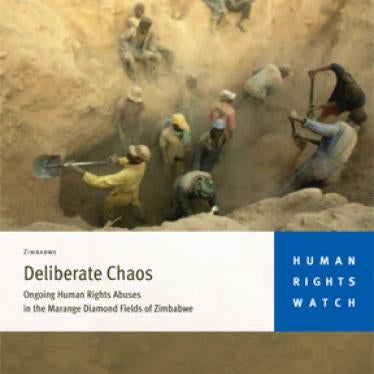(Jerusalem) - The Kimberley Process Certification Scheme should not allow further exports from the Marange diamond fields in Zimbabwe until the government makes clear progress in ending abuses and smuggling, Human Rights Watch said today. Participants in the scheme, an international body that oversees the diamond trade, are scheduled to meet in Jerusalem from November 1 to 4, 2010.
Human Rights Watch research from July through September established that large parts of the fields remain under the control of the Zimbabwe Defence Forces soldiers, who harass and intimidate the local community and engage in widespread diamond smuggling.
In November 2009, the government of Zimbabwe and the Kimberley Process agreed to a joint work plan, in which Zimbabwe committed to a phased withdrawal of the armed forces from the diamond fields, and for a monitor to examine and certify that all shipments of diamonds from Marange met Kimberley Process standards.
"The government made a lot of promises, but soldiers still control most diamond fields and are involved in illicit mining and smuggling," said Rona Peligal, Africa director at Human Rights Watch. "Zimbabwe should mine its diamonds without relying on an abusive military that preys on the local population."
Human Rights Watch has repeatedly called on Kimberley Process members to address human rights abuses in Marange and recognize human rights issues as a fundamental element of the Kimberley Process Certification Scheme mandate.
At a special meeting in St Petersburg, Russia, in July, Kimberley Process members agreed to permit Zimbabwe to export two shipments of diamonds under supervision of the body's monitors, on condition that the body would investigate conditions in the Marange fields. The agreement also tied all future exports of diamonds to clear and measurable progress in ending smuggling and abuses, and allowed for local civil society groups to participate in monitoring progress in the fields.
Human Rights Watch learned that the Kimberley Process team sent in to review conditions in the fields in August was routinely obstructed by government officials from conducting its activities and was unable to gather crucial information about conditions in the majority of diamond fields.
In recent investigations in Zimbabwe, Human Rights Watch researchers found that while violence had decreased in the fields, the army and police continued to commit abuses, which put Zimbabwe in violation of the minimum standards required for membership in the Kimberley Process:
- The Zimbabwean army uses syndicates of local miners to extract diamonds. Local miners told Human Rights Watch that the army coercively recruits local people to help the army dig for diamonds. Many people are afraid to refuse, fearing that the soldiers will beat and harass them.
- In July, a scuffle between police, soldiers, and local miners ended in the death of a miner, who was hit over the head with an iron bar by a policeman. There has been no investigation into the miner's death.
- Widespread smuggling of Marange diamonds has not ended. Scores of buyers and middlemen openly trade in Marange diamonds in the small Mozambican town of Vila de Manica, 20 miles from Mutare.
"The Kimberley Process should not allow the export of further shipments of diamonds from Marange until there is meaningful progress to end smuggling and abuses by the army," Peligal said. "Without these kinds of reforms, international consumers risk purchasing 'blood diamonds.'"
Certain portions of the fields are being mined by private firms with clear connections to members of the former ruling party, the Zimbabwe African National Union Patriotic Front (ZANU-PF) and the military, which continues to engage in smuggling in the fields.
With elections proposed for 2011, reports of ZANU-PF and military involvement in diamond mining raise serious concerns that revenue from the diamonds will be used to fund political violence ahead of the elections, Human Rights Watch said.
"Revenue from Marange should benefit the people of Zimbabwe, not finance political violence," Peligal said.
The Kimberly Process Certification Scheme consists of governments and observers from the diamond industry, and nongovernmental organizations, who meet once a year to discuss the implementation of the scheme.







